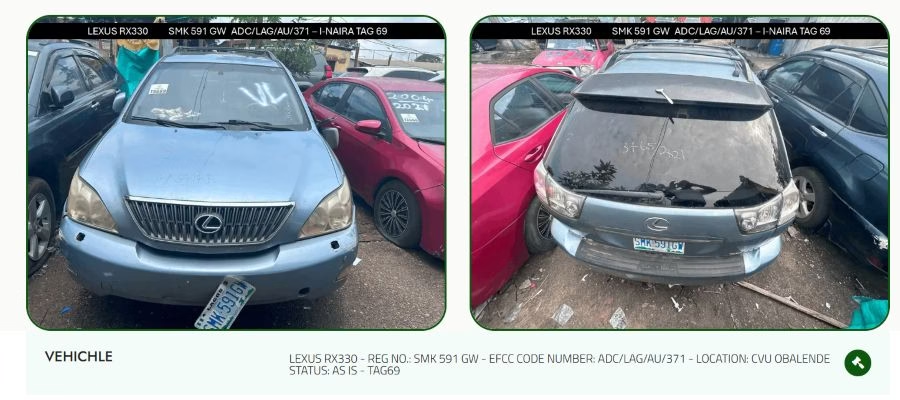A recent car e-auction organized by the Economic and Financial Crimes Commission (EFCC) has been mired in controversy, with multiple bidders accusing the agency and its auctioneers of fraudulent practices. Participants have reported issues ranging from deleted accounts and replaced winning bids to suspicious alterations in the bidding process. In response to the growing outcry, the EFCC has issued a statement acknowledging the complaints and pledging to review the process.

Several participants have taken to social media to share their experiences, alleging that the EFCC and its auctioneers, Areogun Resources Nigeria Ltd and USBU-A Limited Auction, manipulated the process to their disadvantage. Here are some of the most troubling accounts:
One bidder, Frank (@iamFRANQ), who participated in the auction via USBUA.NG, reported placing the second-highest bid of ₦3,500,000 for a black Toyota Camry (APP487HR). After the auction closed, they discovered their account had been deleted, and their bid was replaced with another user’s bid under the username GODDAYOCHIE8. Shockingly, this new bid was timestamped January 28, 2025, at 6:54 PM—over a day after the auction officially closed on January 27 at 4 PM.
The bidder also noted a suspicious pattern in the winning bids: the top two bidders, OCHIEGODDY (₦4,500,000) and GODDAYOCHIE8 (₦3,500,000), shared strikingly similar usernames, fueling suspicions of foul play.
This has to be the most blatant robbery of all time. The @officialEFCC car auction was a complete failure and a fraud. Let me share my experience: https://t.co/o1UllF37i4 pic.twitter.com/mUEecoIETL
— I M Frank ⭐⭐ (@iamFRANQ) January 29, 2025
Another participant, Daniel Momoh (@Dan_Momoh), claimed he legitimately won four vehicles during the auction:
- Toyota Venza – ₦2,670,000
- Lexus ES350 – ₦2,000,000
- Lexus IS250 – ₦2,520,000
- Toyota Camry – ₦1,500,000
However, Momoh woke up the next morning to find his name had been replaced with another bidder’s name on all four vehicles. He was also blocked from accessing the auction website using the account he had created prior to bidding. In a tweet directed at the EFCC, Momoh expressed his disappointment, calling the process a “cheat” and demanding accountability.
Dear @officialEFCC it’s a pity that you & your auctioneer cheated us out a legitimate process we engaged in yesterday where I won 4 four different vehicles namely:
– Toyota Venza – 2,670,000
– Lexus ES350 – 2,000,000
– Lexus IS250 – 2,520,000
– Toyota – Camry – 1,500,000 https://t.co/GoRvX47OB5
— Daniel Momoh (@Dan_Momoh) January 28, 2025
Austin Dakor (@AustinDakor), another bidder, provided detailed evidence of irregularities in the auction conducted by Areogun Resources Nigeria Ltd. According to Dakor, winning bids were altered on the auction website after the bidding had officially closed. He shared screenshots of bids he had won outright, as well as those where he was the second-highest bidder.
Dakor also highlighted a suspicious bid under the name “Nwanebu Elias”, which appeared after the auction had closed. He questioned how a new bid could be submitted after the deadline and called for an investigation into the matter. Dakor emphasized the need for transparency, stating, “We demand integrity and transparency.”
Dear @officialEFCC
The manipulation in the recent car auction by Areogun Resources Nig Ltd is blatant! Winnings bids were altered on their website after bidding closed. Follow thread for screenshots. Transparency is demanded. #EFCCauction #integrity #Transparency pic.twitter.com/lPnZT7vDJF
— Austin Dakor (@AustinDakor) January 28, 2025
In response to the allegations, the EFCC issued a press statement on January 30, 2025, acknowledging the complaints and expressing concern over the “unsavoury experiences” of some bidders. The Commission confirmed that it had received reports of technical glitches, including:
- Inability of some participants to access the auctioneers’ websites.
- Users being shut out of the platforms after submitting bids.
- Outrageous bid prices and other irregularities.
The EFCC stated that its relevant departments had monitored the exercise and communicated observed glitches to the auctioneers for remedial action. However, the Commission clarified that it could not directly intervene during the auction, as the process was handled by accredited auctioneers in line with the Proceeds of Crime (Recovery and Management) Act, 2022, and the Public Procurement Act, 2007.
The EFCC attributed some of the challenges to the overwhelming number of participants—over 4 million—which may have stretched the auctioneers’ online facilities. Unstable internet services in parts of the country were also cited as contributing factors.
The Commission assured the public that it is awaiting a report from the auctioneers and will review genuine complaints to ensure no one is short-changed. It reiterated its commitment to transparency and fairness, stating, “The Commission’s only interest in the public auction is to ensure that the assets are disposed of in the most transparent manner and the nation gets value for the assets. This cannot be compromised under any circumstance.”
Despite the EFCC’s assurances, the allegations have sparked widespread outrage on social media, with many bidders labelling the auction as a “scam” and a “blatant robbery.” The hashtag #EFCCFraud has been trending on X (formerly Twitter), as more participants come forward with similar stories.
Critics have called for an independent investigation into the auction process, urging the EFCC to hold its auctioneers accountable for the reported irregularities. Many have also demanded compensation for affected bidders and a more transparent system for future auctions.








